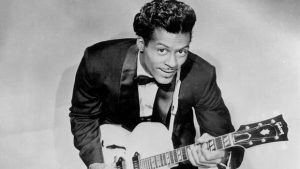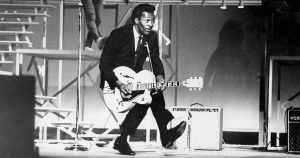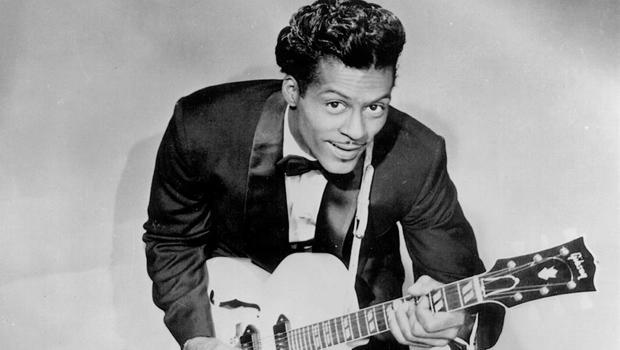Berry’s songwriting, guitar playing and legendary dance moves inspired scores of celebrated musicians and music lovers alike.
Nick Krewen
Music, Sun., March 19, 2017
The true king of rock ’n’ roll has died.

The late, great, Chuck Berry
Post 1955, you can list any number of stratospheric acts that followed Chuck Berry — Elvis . . . the Beatles . . . the Rolling Stones . . . the Beach Boys — and as much as each one of those performers inspired countless musicians to learn an instrument, sing into a microphone or enter a recording studio, it was the son of a St. Louis, Mo., contractor who ultimately planted the seed.
Presley may have had the swagger and sexuality to take rock ’n’ roll to the masses, but Berry was its architect.
A masterful songwriter who incorporated resilient melodies and clever, poetic lyrics into an effortless fusion of blues, rhythm and blues and country music with a lively beat, Berry delivered his energetic messages with what writer Billy Altman once described as a “racially ambiguous voice” that, in the discriminatory days of the ’50s, fared well enough with U.S. radio programmers to get him played on the radio.
“I do think it had a lot to do with my diction,” Berry once told music archivist Andy McKaie. “The pop fan could understand what we were saying better than many other singers.”
His biggest hits, which formed the musical bible for countless young musicians taking up the guitar, singing into the microphone or rehearsing their basement or garage bands, remain ageless: “Johnny B. Goode,” “Roll Over Beethoven,” “School Days,” “Maybellene,” “No Particular Place To Go,” and many others. Capturing the crux of 1950s teenage life, imbuing his tales of fast cars, pretty women and exciting music with an occasional sense of humour and implied social commentary.

Chuck and the duck
As a guitarist, there isn’t a serious axeman around who didn’t pick something up from the school of Berry and his lightning, T-Bone Walker-inspired licks, amateur or pro.
“He inspired me and thousands of others to learn how to play guitar,” recalls Al Mair, a former Gordon Lightfoot manager and owner of the Attic Records label, who attended several of the all-star revues that played Maple Leaf Gardens between 1956 and 1957 that featured Berry in the lineup.
“I never learned how to play very well, even though I took lessons. No question, I was a fan of guitar players and Chuck was at the top of the list as far as rock ’n’ roll was concerned.”
Which brings us to his showmanship: while he dazzled on the electric guitar, Chuck Berry simply outshone his peers, incorporating such gimmicks as his legendary duck walk, his trademark hopping across the stage on one foot and on bended knee (as copped by AC/DC’s Angus Young) or spreading his legs and lowering himself to the floor while executing a guitar solo.
“Nobody could follow him,” remembers Mair.
“Most of the acts would have two or three mics, would stand there and sing and snap their fingers.
“But when Chuck came out, he’d use the whole stage. He did his duck walk and his other great visuals and would always play just before intermission. He was the best showman on any of those shows, even though he wasn’t a headliner.”
Berry visited Toronto often, including being part of the bill of 1969’s legendary Toronto Rock and Roll Revival that debuted John Lennon’s Plastic Ono Band, although his last appearance — when he helped christen the SkyDome as a music venue in 1989 as part of The Legends of Rock ’N’ Roll lineup — found him at odds with the audience after he announced he would not allow his image to be projected on the Jumbotron.
Although someone relented and flipped on the switch for Berry’s last few numbers, the gaffe probably had something to do with projection not being part of the performer’s contract — which brings us to Berry’s business chops.
As Bob Roper, currently vice-president and chairperson of Harris Institute’s Art Management program, remembers when he booked Berry for a McMaster University concert back in 1970, Chuck was a stickler for details.
“He was absolutely pleasant until I breached the contract,” Roper recalls.
“He came in late afternoon. At 8 p.m., the opening act Lighthouse were four songs into their set, and I got word that Chuck wanted to see me immediately.
“He had me almost pinned against the wall, saying, ‘I’m out of here — you breached the contract.’ ”
Roper said Berry had two bones of contention: he was being paid by certified cheque instead of cash, as stipulated in his contract, but more pressingly, he had expected to go on at 8 p.m. because he had an 11:30 p.m. plane to catch to St. Louis.
After playing his contracted 75 minutes, Berry put his arm around Roper’s shoulder and said, ‘OK white boy, I hope you learned your lesson. Always read your contracts closely.’ I teach that in my classes at Harris still.”
There will never be another like him.
Chuck Berry was the true king of rock ’n’ roll | Toronto Star


Be the first to comment on "Chuck Berry was the true king of rock ‘n’ roll"